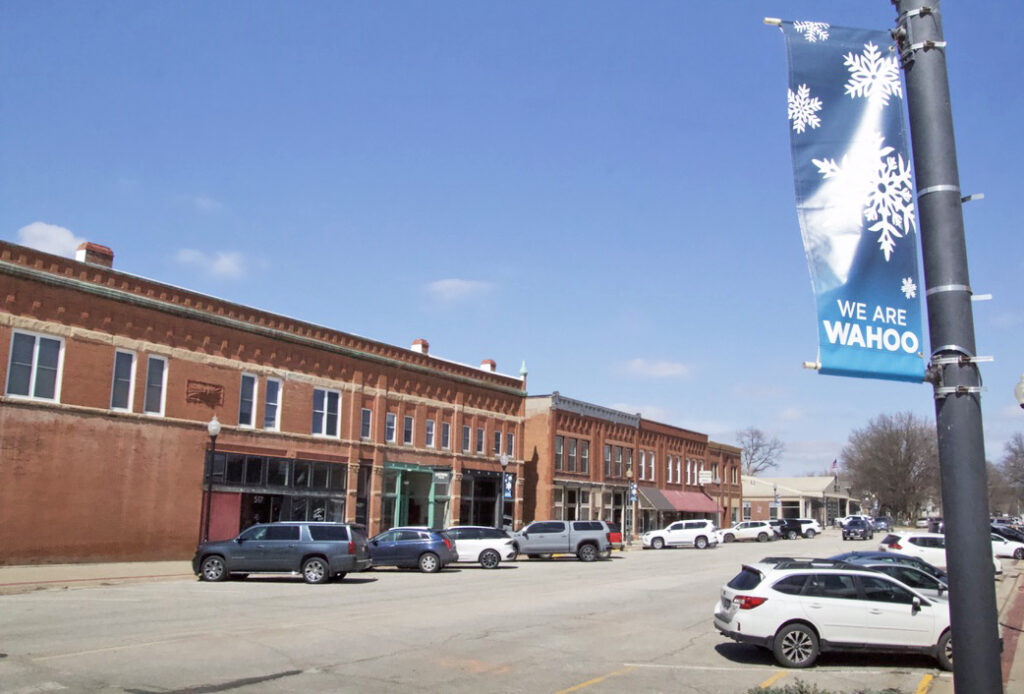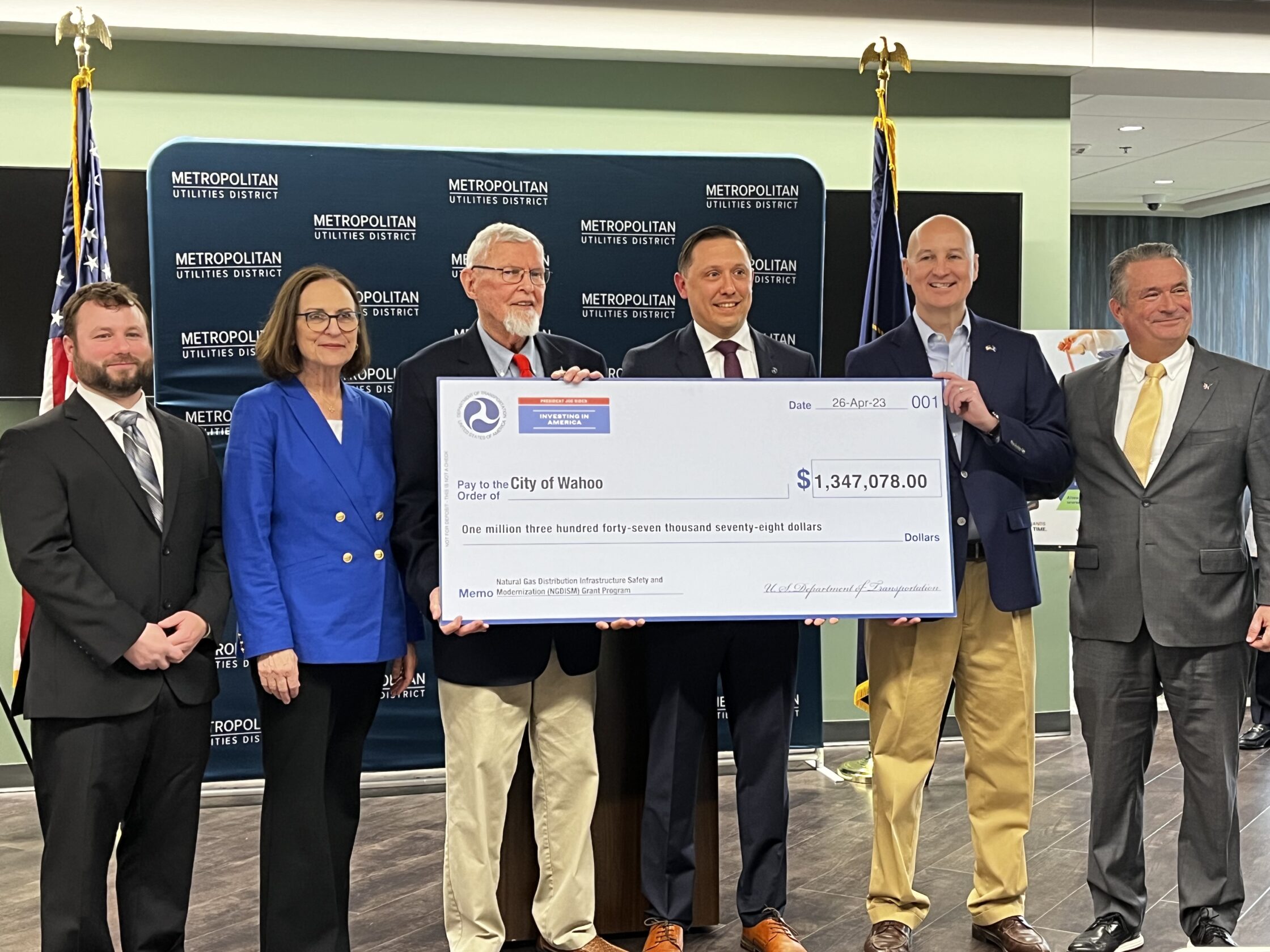Melissa Harrell watched from the crowd as three smiling members of Nebraska’s congressional delegation presented an oversized check for $1.3 million to her City of Wahoo colleagues.
The federal grant would allow the city of 5,000 to replace 2 miles of century-old, leak-prone natural gas pipes. Sen. Deb Fischer, a Republican who voted for the bill that created the grant program, touted the award as proof that “real, bipartisan, and responsible infrastructure reform is possible.”
Less than a year later, Harrell was in Washington, seeking assurance from those same politicians that the federal government was still good for the money it promised to her town.
Shortly after taking office in January, President Donald Trump ordered agencies to freeze funding for infrastructure and climate programs approved under his predecessor Joe Biden.
The sweeping move paused payments to more than a dozen Nebraska cities, villages and utility providers for gas line replacement projects totaling millions of dollars and energy efficient lighting upgrades with price tags in the tens of thousands of dollars. The impacted grant recipients range from a village of 270 to a public utility serving 600,000.
The grants now appear to be unfrozen, and local leaders who responded to the Flatwater Free Press said they are optimistic the money will eventually come through. Still, some said they were uncertain on the status of the funding and frustrated with the setback.
At least eight temporarily delayed or still haven’t begun work, which could lead to higher costs. Two spent thousands of dollars on materials prior to the freeze, which temporarily left them in limbo.
Wahoo and others sunk staff time and consultant fees into a drawn-out application process. Separate from the gas line project, a $100,000 grant to install energy efficient streetlights in Wahoo was also frozen. After all that work, it was disappointing to see the grants suddenly suspended, Harrell said.
“I think that’s the frustrating part about it because if we did that to the people here in our own community, that wouldn’t be acceptable,” she said.
Days ago, the federal Department of Transportation sent an agreement committing the agency to reimbursing the city once the pipe project is complete.
It’s a good sign, but uncertainty will remain “until the money is in the account,” said Wahoo utilities general manager Ryan Hurst. Without the funding, the gas pipe replacement would cost each utility ratepayer around $800.
“Obviously these projects are for a direct need for our constituents,” Rep. Don Bacon, a Republican whose Omaha-area district includes Wahoo, said in a statement to FFP. “Hard infrastructure projects should continue to be funded.”
The grants Trump froze — part of the 2021 bipartisan infrastructure bill — represented a rare opportunity for cities like Wahoo to resolve ordinary maintenance concerns with outside money, Harrell said.
In her 30 years with the city, Harrell said she hadn’t before seen that level of federal backing for infrastructure upgrades.
“It’s nice to see the federal dollars come back in something that we can see, that we know is like a return on our tax investment that goes out of our paychecks,” she said.
Getting the pipe replacement grant in the first place was its own battle. DOT rejected Wahoo’s initial appeal for funding, but the city came back better prepared in 2023, Hurst said.
The second go-around, the city paid $14,000 to bring in consultants from engineering firm HDR to complement the many hours of work staff sunk into the application, Hurst said. Fischer and Bacon added letters of support.
A spokeswoman for Fischer did not respond to requests for comment.
The event where Wahoo received its giant check for $1.3 million felt momentous. Hurst even gave an acceptance speech in the company of Fischer, Bacon and Sen. Pete Ricketts.
That same day, the Metropolitan Utilities District walked away with its own prop check for $25.2 million to replace 89 miles of natural gas lines installed in the late 1800s and early 1900s.
Like Wahoo, MUD saw an initial pause in progress on its project. But the public utility, which serves most of the Omaha metro area, has since heard from DOT that the project aligns with the Trump administration’s goals and the grant will likely come through, said Director of Program Management Stephanie Henn. MUD is now working with the agency on a final review.
After FFP asked about the two held-up grants, a DOT spokesperson said Tuesday the department sent Wahoo and MUD grant agreements to sign in the past week.
DOT needed time to review the Biden-era awards “to ensure Americans’ tax dollars aren’t subsidizing DEI, climate, or other wasteful requirements,” the spokesperson said.
Trump’s funding freeze also extended to energy efficiency grants awarded to about a dozen Nebraska cities and villages through the federal Department of Energy.
Grant winners got word of the pause in February from a supervisor with the Nebraska Department of Environment and Energy, the state agency administering the federal dollars.
“As of January 29th, we have not been able to draw any federal funding, and the DOE has not communicated to us when that will resume,” the Feb. 6 email said. “We were hoping to get guidance from DOE by now but since we have not, we are advising sub-awardees to pause their work until we get more information.”
Five weeks later, NDEE informed the cities and villages it had reconnected with the DOE and could restore access to funds for project reimbursements, but “there is still some uncertainty.”

“Aside from confirming our access to current funds, they have not shared any information about future funding,” the March 14 email said.
“We recognize that some communities have already started their projects, and we will continue processing reimbursements as long as funds are available. Communities that wish to delay their projects are welcome to do so, though there has been no indication from the DOE that future funding will not be accessible.”
NDEE spokeswoman Carla Felix said the March memo aimed to clarify that funds for the program were unfrozen. Some, but not all, grant-winning towns interpreted it that way.
Hickman, a growing city south of Lincoln, moved ahead with its downtown street lighting project, spending about $67,000 on parts and labor, said City Administrator Kelly Oelke. The city is awaiting response to its reimbursement filing, but Oelke is confident the money will come through — even if it takes a bit longer than originally expected.
Emerson, a village of 800 in northeastern Nebraska, had not yet ordered materials and Village Clerk Beth Bonderson interpreted the uncertainty portrayed by NDEE as a signal to hold off.
Shickley Treasurer Wade Walters said last week the latest he heard from NDEE was that the funds were still frozen. The village, population 350, hasn’t started its project.
“It is what it is for us. We’re not in control of it, so we just kinda have to take what happens when it happens,” Walters said.
DOE spokeswoman Emery Washington said the department was reviewing grants and loans “to ensure all activities are consistent with President Trump’s executive orders and priorities.”
“The American people provided President Trump with a mandate to govern and to unleash ‘American Energy Dominance,’” Washington said in an email. “The Department of Energy is hard at work to deliver on President Trump’s promise to restore affordable, reliable, and secure energy to the American people.”
Felix declined to comment when asked if she has confidence the federal government will pay out the grants, but she said NDEE has paid out some reimbursements to Nebraska towns in the last month.
If municipalities have to put off necessary infrastructure projects because grants are held up or withdrawn, cheap repairs could turn into costly replacements, said Marsia Geldert-Murphey, the Illinois-based past president of the American Society of Civil Engineers.
Municipal budget makers thrive on certainty, and some cities may have pushed back projects when the funding to cover them was in doubt, said Josh Moenning, a renewable energy lobbyist and former Norfolk mayor.
With inflation and ever-shifting tariffs driving up prices, the same projects could cost significantly more next year, said Moenning, who traveled to Washington with Harrell and others.
“They have to plan according to what’s been obligated, and if there’s any question about money that was committed being taken away, it causes a lot of disruption,” Moenning said.



3 Comments
More than 70% of Saunders County residents voted for Trump and the chaos that he promised. Don’t feel too bad for them.
Ricketts and Fischer are claiming credit for a program they voted against.
I see the Omaha World Herald printed your story in their paper yesterday. Do they pay you for using it? They should. You write very well!